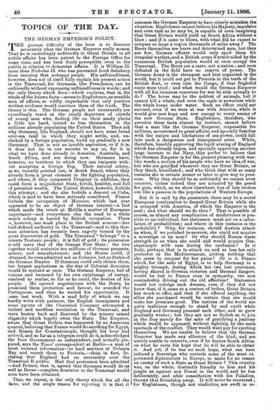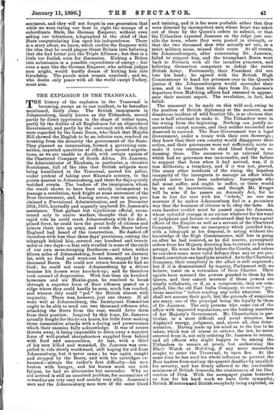TOPICS OF THE DAY.
THE GERMAN EMPEROR'S POLICY. THE gravest difficulty of the hour is to discover accurately what the German Emperor really means. That he is exceedingly unfriendly to Great Britain in all public affairs has been patent to the Foreign Office for some time, and has been dimly perceptible even to the public in relation to Armenian affairs. It is William II. more than Nicholas II. who has prevented Lord Salisbury from rescuing that unhappy people. His unfriendliness, however, does not of itself fully explain his present action in the Transvaal, for Germans, like Frenchmen, can be unfriendly without expressing unfriendliness in words; and the only theory which does—which explains, that is, the whole of the known facts—seems to Englishmen, as sensible men of affairs, so wildly improbable that only positive written evidence would convince them of the truth. The theory is this. The German people not unnaturally are exceedingly vexed at the yearly departure of crowds of young men who, finding life on their sandy plains a little too hard, intend to lose themselves in the millions already populating the United States. They ask why Germany, like England, should not have some broad over-sea land in which they might settle, and, un- choked by a foreign population, build up gradually a new Germany. That is not an ignoble aspiration, or if it is, it does not lie in our mouths to say so, for it is what we have done already in America, Australia, and South Africa, and are doing now. Germans have, however, no territory to which they can emigrate with- out accepting a foreign flag. Their natural colony, as we recently pointed out, is South Brazil, where they already form a great element in the fighting population, and where, if they conquered Uruguay in addition, they could form a magnificent State, fertile, healthy, and full of potential wealth. The United States, however, forbids this attempt ; and she also forbids a descent on Cuba, which is said to have been seriously considered. France forbids the occupation of Morocco, which last year appeared to be an object of German interest—a fact which made the revolt at Melilla a matter of European tinportanc,e—and everywhere else the road to a white man's colony is barred by British occupation. There is, however, one weak place in the British armour—her half-defined authority in the Transvaal—and to this Ger- man attention has recently been eagerly turned by the great discoveries of gold. The Transvaal " belongs " to a minute Teutonic people ; it is full of gold ; its possession would carry that of the Orange Free State ; the two together would maintain ten millions of German peasants, miners, and manufacturers; and the States could, if obtained, be even admitted not as Colonies, but as States of the German Empire. If Germany could only obtain them, her largest aspirations in the way of Colonial dominion would be realised at once. The German Emperor, full of visions and harassed by his own surplusage of energy, resolved to realise, so far as he could, the desires of his people. He opened negotiations with the Boers, he promised them protection and favour, he sounded the Portuguese, and then he waited his opportunity. It 321.030 last week. With a mad folly of which we can hardly write with patience, the English immigrants and some agents of the Chartered Company attempted a violent and needless revolution in the Transvaal, and were beaten back and disarmed by the minute armed oligarchy which legally owns the State. The Emperor, aware that Great Britain was hampered by an American quarrel, believing that France would do anything for Egypt, and Russia for Constantinople, thought his hour had arrived, and so far as a telegram could do it, acknowledged the Boer Government as independent, and actually pre- pared, says the Times' correspondent at Berlin—a man of most unusual information—to land marines at Delagoa Bay and march them to Pretoria,—thus, in fact, de- claring that England had no suzerainty over the , Transvaal R public. Had that pretension been admitted —had Britain, that is, agreed that Germans would do as well as Boers—complete dominion in the Transvaal would soon have been obtained.
That, we repeat, is the only theory which fits all the !acts, and the single reason for rejecting it is that it assumes the German Emperor to have utterly mistaken the situation. Englishmen cannot believe his Majesty, impulsive and even rash as he may be, is capable of even imagining that Great Britain would yield up South Africa without a blow ; and if it came to blows, with what did he expect to conquer so large a region thousands of miles away ? The Boers themselves are brave and determined men, but they are few, German officers would only spoil them for irregular warfare, and a British corps cllarm6e aided by the numerous British population would at once occupy the Transvaal. The Boers are a caste, not a nation ; and once defeated in the field have no reserve of power. The German Army is the strongest and best organised in the world, but it could not get to Pretoria in the teeth of the British fleet, or even into the Congo, if that frightful route were tried ; and what would the German Emperor with all his immense resources for war be able actually to do ? The horse may be the noblest of animals, but it cannot kill a whale, and even the eagle is powerless while the whale keeps under water. Such an effort could not succeed, even if we were at war with America, while it would give new hope and new energy to every enemy of the new German State. Englishmen, therefore, who perceive these facts almost by instinct, cannot believe that a man like the German Emperor, responsible for millions, accustomed to great affairs, and specially familiar with the nature and limitations of sea-power, could fall into such a dangerous and transparent error. While, therefore, heartily approving the rapid arming of England which has already begun, and specially approving another large increase to the Navy, they prefer to believe that the German Emperor is for the present pleasing with war- like words a section of his people who have no idea of war, but who are gratified whenever they see Great Britain, as they think, humiliated ; and who think that with so many enemies she is certain sooner or later to give way to pres- sure. Why they should be so unfriendly we cannot even conceive, unless indeed they are actuated by the greed for gain, which, as we show elsewhere, has of late broken out like a passion in the populations of Western Europe.
But it is said by the pessimists there may be a secret European combination to despoil Great Britain while she is occupied with America, of which the Emperor is the soul ; and what should we do then ? That is possible of course, as almost any complication of misfortunes is pos- sible to an individual, but statesmen must act on a calcu- lation of probabilities ; and where in this instance is the probability ? Why, for instance, should Austria attack us when, if we perished to-morrow, she could not acquire a sovereign or an acre ? Or why should Russia waste strength on us when she could and would acquire Con- stantinople with ease during the confusion ? Is it Italy, perhaps, that is to attack us, and so lose her only protector in the Mediterranean, getting nothing that , she cares to conquer for her pains ? Or is it France which, for the sake of Egypt, is to help Germany to a mighty triumph, during which her two lost provinces, having shared in German victories and German dangers, would be lost to France even in sympathy, the new comradeship driving out the old affection? Statesmen would not indulge such dreams, even if they did not know that, if it came to a contest of bribes, Great Britain has much to offer, and that if she offered anything, the allies she purchased would be certain that she would make her promises good. The nations of the world are quite malicious enough to stand by and exult while England and Germany pummel each other, and so grow gradually weaker ; but they are not so foolish as to join in the fray merely for the sake of gratifying a jealousy which would be appeased, without fighting, by the mere spectacle of the conflict. They would want pay for exerting themselves. We are unable to believe that the German Emperor has made any alliances of the kind, and are utterly unable to conceive, even if he desires South Africa, on what he rests his hope that he will be able to obtair it. And yet, if he has no such hope, what can have induced a Sovereign who controls some of the most ex• perienced diplomatists in Europe, to make for no reason an enemy of such a State as Great Britain ? This country was, on the whole, distinctly friendly to him and his people as against any Power in the world, and he has deliberately, and after consultation with his Paladins, thrown that friendship away. It will never be recovered ; for Englishmen, though not vindictive, are swift in re- sentment, and they will not forget in one generation that while we were trying our best to right the wrongs of a subordinate State, the German Emperor, without even asking our intentions, telegraphed to the chief of that State congratulating him upon his independence. There is a story afloat, we know, which credits the Emperor with the idea that he could plague Great Britain into believing that she had better join the Triple Alliance; but that is a little too foolish even for discussion. Kicking a Briton into submission is a possible expenditure of energy ; but even a man like the German Emperor, who seldom judges men aright, would hardly dream of kicking him into friendship. The puzzle must remain unsolved ; and we, who desire only peace with all the world except Turkey, must arm.



































 Previous page
Previous page